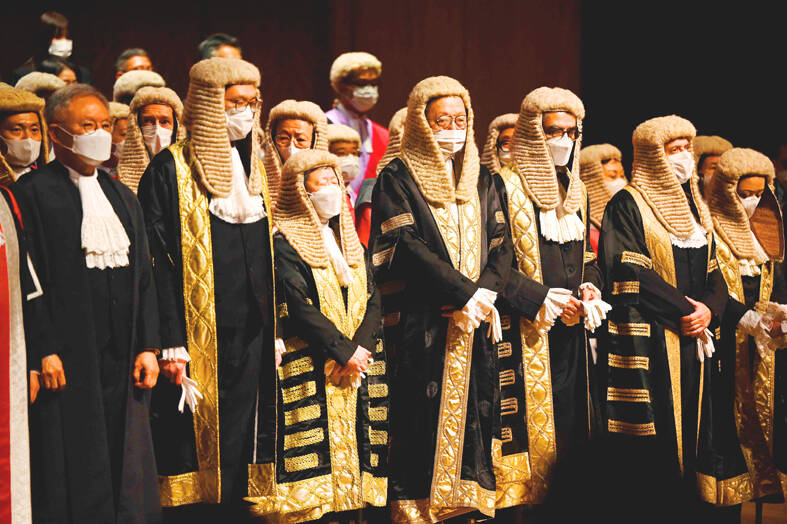A Hong Kong court on Friday sentenced a student to two months imprisonment for sedition over pro-independence social media posts she published while studying in Japan.
This is the first known Hong Konger convicted under the colonial-era sedition law over online speech in Japan.
Scholars and overseas activists say this case represents an alarming escalation of the chilling effect experienced by those who continue to engage with Hong Kong affairs.

Photo: AFP
Hong Kong Chief Magistrate Victor So (蘇惠德) sentenced the student to two months in jail after her guilty plea, saying deterrent sentencing was needed because “ignorant people would be incited subtly.”
Mika Yuen, 23, pleaded guilty to sedition late last month for 13 pro-Hong Kong independence social media posts on Facebook and Instagram shared from September 2018 to March this year.
According to the prosecutor, most of the posts were published when she was studying in Japan, with messages saying: “I am a Hong Konger; I advocate for Hong Kong independence,” and “Hong Kong independence, the only way out.”
Among the 13 alleged social media posts, only two posts were shared from Hong Kong.
She was arrested in March after returning to the city to renew her identity card.
The defense had earlier disputed whether the magistrate’s court had extraterritorial jurisdiction over the posts she published abroad, but they abandoned the dispute as Yuen did not remove the content.
Sedition is punishable by a maximum jail term of two years upon conviction. It is not among the offenses criminalized by the Beijing-imposed National Security Law, but it has been ruled by the Hong Kong Court of Final Appeal as an act that can endanger national security.
In related news, a US bill was introduced on Thursday calling for sanctions against 49 Hong Kong officials, judges and prosecutors involved in national security legal cases.
The Hong Kong Sanctions Act is a bipartisan bid by US congresspeople in the US House of Representatives and the Senate. It would require the US president to determine whether the Hong Kong officials named in it qualify for sanctions under existing US legislation, including the Global Magnitsky Human Rights Accountability Act and the Hong Kong Human Rights and Democracy Act of 2019.
Officials named in the bill include Hong Kong Secretary for Justice Paul Lam (林定國), Committee for Safeguarding National Security secretary-general Sonny Au (區志光), Police Commissioner Raymond Siu Chak-yee (蕭澤頤), Chief Justice Andrew Cheung (張舉能) and High Court Judge Esther Toh (杜麗冰).
In response, Hong Kong on Friday condemned the move, saying US legislators were grandstanding and trying to intimidate the city.
A city government spokesperson said that US politicians should stop acting against international law and norms of international relations and stop interfering in Hong Kong matters, which were “purely China’s internal affairs.”
Beijing imposed the National Security Law on Hong Kong in 2020 after months of pro-democracy protests.

A Ministry of Foreign Affairs official yesterday said that a delegation that visited China for an APEC meeting did not receive any kind of treatment that downgraded Taiwan’s sovereignty. Department of International Organizations Director-General Jonathan Sun (孫儉元) said that he and a group of ministry officials visited Shenzhen, China, to attend the APEC Informal Senior Officials’ Meeting last month. The trip went “smoothly and safely” for all Taiwanese delegates, as the Chinese side arranged the trip in accordance with long-standing practices, Sun said at the ministry’s weekly briefing. The Taiwanese group did not encounter any political suppression, he said. Sun made the remarks when

The Taiwanese passport ranked 33rd in a global listing of passports by convenience this month, rising three places from last month’s ranking, but matching its position in January last year. The Henley Passport Index, an international ranking of passports by the number of designations its holder can travel to without a visa, showed that the Taiwan passport enables holders to travel to 139 countries and territories without a visa. Singapore’s passport was ranked the most powerful with visa-free access to 192 destinations out of 227, according to the index published on Tuesday by UK-based migration investment consultancy firm Henley and Partners. Japan’s and

BROAD AGREEMENT: The two are nearing a trade deal to reduce Taiwan’s tariff to 15% and a commitment for TSMC to build five more fabs, a ‘New York Times’ report said Taiwan and the US have reached a broad consensus on a trade deal, the Executive Yuan’s Office of Trade Negotiations said yesterday, after a report said that Washington is set to reduce Taiwan’s tariff rate to 15 percent. The New York Times on Monday reported that the two nations are nearing a trade deal to reduce Taiwan’s tariff rate to 15 percent and commit Taiwan Semiconductor Manufacturing Co (TSMC, 台積電) to building at least five more facilities in the US. “The agreement, which has been under negotiation for months, is being legally scrubbed and could be announced this month,” the paper said,

Japan and the Philippines yesterday signed a defense pact that would allow the tax-free provision of ammunition, fuel, food and other necessities when their forces stage joint training to boost deterrence against China’s growing aggression in the region and to bolster their preparation for natural disasters. Japan has faced increasing political, trade and security tensions with China, which was angered by Japanese Prime Minister Sanae Takaichi’s remark that a Chinese attack on Taiwan would be a survival-threatening situation for Japan, triggering a military response. Japan and the Philippines have also had separate territorial conflicts with Beijing in the East and South China